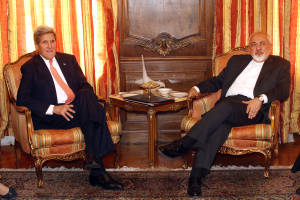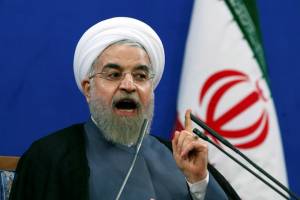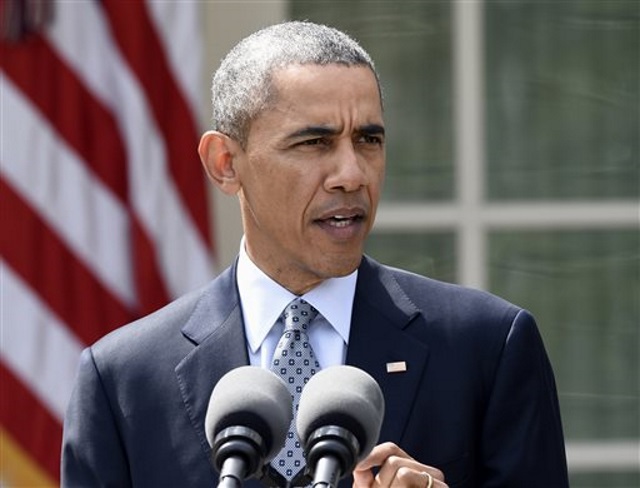
US Secretary of State John Kerry (L) with Iranian Foreign Minister Mohammad Javad Zarif. (AP/Jason DeCrow)
The deadline for the nuclear talks with Iran has come and gone, with significant differences remaining and leaders on both sides voicing threats.
US President Barack Obama threatened Tuesday to walk away from the nuclear negotiations with Iran.
“The framework agreement that was established at Lausanne is one that, if implemented effectively and codified properly, would, in fact, achieve my goal, which is Iran not obtaining a nuclear weapon,” Obama said during a news conference with Brazilian President Dilma Rousseff.
“There has been a lot of talk on the other side from the Iranian negotiators about whether, in fact, they can abide by some of the terms that came up in Lausanne. If they cannot, that’s going to be a problem because I’ve said from the start, I will walk away from the negotiations if, in fact it’s a bad deal,” he said.
“If we can’t provide assurances that the pathways for Iran obtaining a nuclear weapon are closed and if we can’t verify that, if the inspections regime, verifications regime, is inadequate, then we’re not going to get a deal and we’ve been very clear to the Iranian government about that,” Obama explained.
Regarding Iran’s refusal to disclose fully its nuclear history, Obama said that “given past behavior on the part of Iran, that can’t simply be a declaration by Iran and a few inspectors wandering around every once in a while. That’s going to have to be a serious, rigorous verification mechanism. And that, I think, is going to be the test as to whether we get a deal or not.” The full inspection of Iran’s nuclear sites by UN inspectors, including its military bases, which are suspected of hosting part of Iran’s nuclear program, has been a major point of contention.
The P5+1 Powers, led by the US, are demanding full access and disclosure, while Iran is refusing any access to its military sites and is enabling only limited passage to its civilian nuclear projects.
In the meantime, pushing past the Tuesday deadline, world powers and Iran extended negotiations for a comprehensive nuclear agreement by a week.
The State Department announced the extra days of talks only hours before the expiration of the target date for their completion. Thoughts of meeting the deadline had been long-abandoned even though the US initially announced it would not extend the talks.
US Secretary of State John Kerry held a day of meetings in Vienna with the foreign ministers of Iran and Russia and other key officials.

Iranian President Hassan Rouhani. (AP/Ebrahim Noroozi)
The day originally had been envisioned as the culmination of almost two years of secret and then public negotiations aimed at ensuring Iran could not build a nuclear bomb. However, officials said over the weekend they were nowhere near a final accord, and Iran’s foreign minister flew back to his capital for further consultations amid increased signs of backtracking by his country’s supreme leader, Ayatollah Ali Khamenei.
The week-long extension has political overtones as well. An agreement by July 7 would give the Obama administration time to submit the deal to Congress by July 9. Congress would then have 30 days to review it, during which Obama would not be able to ease sanctions.
If negotiations drag on past July 9 without a deal, that congressional review period would extend to 60 days. If lawmakers were to build a veto-proof majority behind new legislation enacting new economic sanctions or preventing Obama from suspending existing ones, the administration would be prevented from living up to an accord.
Iran Threatens Intensified Nuclear Development
Iran, for its part, warned about consequences if the West fails to hold up its end of the bargain.
The official IRNA news agency reported that President Hassan Rouhani threatened Tuesday that Iran will intensify its nuclear activities if it detects violations from the countries negotiating the deal.
“If we reach a deal, both sides should be committed to it,” Rouhani said in Tehran. “If the other side breaches the deal, we will go back to the old path, stronger than what they can imagine.”
Talks in Austria’s capital restarted Tuesday after a one-day interruption, with Iran’s chief diplomat returning from Tehran and insisting he had a mandate to finalize a nuclear agreement. The promise came despite statements by Khamenei in recent weeks that appeared to renege on a framework that his representatives agreed to three months ago in Lausanne.
The diplomacy has reached a “very sensitive stage,” but progress is possible, Foreign Minister Mohammad Javad Zarif said. Asked by a reporter about his day of meetings at home, he said, “I already had a mandate to negotiate, and I am here to get a final deal, and I think we can.”
Significant disagreements persist, not least over the level of inspections on Iranian sites, how quickly the West would roll back sanctions and what types of research and development Iran would be permitted to conduct on advanced nuclear technology.
By: United with Israel Staff and AP
Sign the Petition to Stop a Nuclear Iran
The US Congress must ensure that sanctions against Iran remain in force until the nuclear threat is completely eliminated.
I strongly oppose easing sanctions before the nuclear threat from Iran has been eliminated. Allowing Iran to enrich uranium without being subject to 'anytime, anywhere' inspections is extremely dangerous and unacceptable. Iran's nuclear program must be stopped.
See our Privacy PolicyDo You Love Israel? Make a Donation - Show Your Support!
Donate to vital charities that help protect Israeli citizens and inspire millions around the world to support Israel too!
Now more than ever, Israel needs your help to fight and win the war -- including on the battlefield of public opinion.
Antisemitism, anti-Israel bias and boycotts are out of control. Israel's enemies are inciting terror and violence against innocent Israelis and Jews around the world. Help us fight back!
